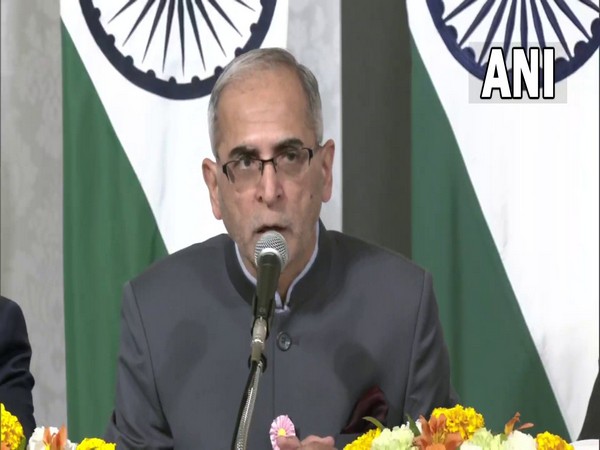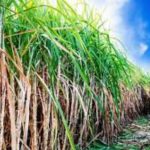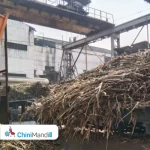Tokyo[Japan], May 25 (ANI): The Indo-Pacific Economic Framework (IPEF) for Prosperity is structured around four pillars including trade and supply chains and collective discussion is being held under these pillars, Foreign Secretary Vinay Mohan Kwatra said here on Tuesday.
Briefing reporters about Prime Minister Narendra Modi’s two-day visit to Japan, he said clean energy, decarbonization, and infrastructure besides tax and anti-corruption are the two other pillars around which IPEF is structured. PM Modi had attended the launch of IPEF launch on Monday.
The event saw the presence of US President Joe Biden, Japan Prime Minister Kishida Fumio, as well as the virtual presence of leaders of other partners countries – Australia, Brunei, Indonesia, Republic of Korea, Malaysia, New Zealand, Philippines, Singapore, Thailand, and Vietnam.
“IPEF is structured around four pillars. And these are currently being negotiated amid the Quad countries. The four pillars are relating to trade, supply chains, infrastructure, clean energy and decarbonisation and tax and anti-corruption. The collective discussion under these pillars will be initiated following the launch of this framework and the final contours will emerge based on discussions among the Quad countries,” Kwatra said.
He said on basis of discussions, the countries will decide which pillar to progress at what speed.
In the joint statement on Indo-Pacific Economic Framework for Prosperity, India, Australia, Japan, the US and the nine other countries emphasised commitment to a free, open, fair, inclusive, interconnected, resilient, secure, and prosperous Indo-Pacific region that has the potential to achieve sustainable and inclusive economic growth.
“We acknowledge our economic policy interests in the region are intertwined, and deepening economic engagement among partners is crucial for continued growth, peace, and prosperity,” the statement said.
It said that the COVID-19 pandemic emphasized the importance of strengthening economic competitiveness and cooperation and securing critical supply chains, while stimulating job growth and improving economic opportunities, including “for our workers, women, medium-and small-enterprises, and our societies’ most vulnerable groups”.
“In the long term, economic competitiveness will be largely defined by our ability to harness technology, promote innovation, participate in the digital economy, justly transition energy systems and achieve energy security, and tackle the climate crisis in a manner that produces equitable, inclusive growth and improves socio-economic welfare.
In order to prepare our economies for the future, we are launching the process to establish the Indo-Pacific Economic Framework for Prosperity,” the statement said.
The statement said that the framework is intended to “advance resilience, sustainability, inclusiveness, economic growth, fairness, and competitiveness for our economies”.
“Through this initiative, we aim to contribute to cooperation, stability, prosperity, development, and peace within the region. We invite participation from additional Indo-Pacific partners that share our goals, interests, and ambitions for the region. We are committed to collaborating with our framework partners in a manner that acknowledges the importance of technical assistance and capacity building, allows us to maintain a flexible approach, and delivers tangible benefits for our peoples.”
Listing the pillars, the statement said that framework partners will be engaging in such discussions on various ways to strengthen economic cooperation to achieve these goals. “We invite other interested Indo-Pacific partners to join us.”
Referring to trade, the statement said that IPEF members seek to build high-standard, inclusive, free, and fair trade commitments and develop new and creative approaches in trade and technology policy that advance a broad set of objectives that fuels economic activity and investment, promotes sustainable and inclusive economic growth, and benefits workers and consumers.
“Our efforts include, but are not limited to, cooperation in the digital economy.”
On supply chains, the statement said that the IPEF is committed to improving transparency, diversity, security, and sustainability “in our supply chains to make them more resilient and well-integrated”.
“We seek to coordinate crisis response measures; expand cooperation to better prepare for and mitigate the effects of disruptions to better ensure business continuity; improve logistical efficiency and support; and ensure access to key raw and processed materials, semiconductors, critical minerals, and clean energy technology,” it said.
On clean energy, decarbonization, and infrastructure, the statement said this involves deepening cooperation on technologies, on mobilizing finance, including concessional finance, and on seeking ways to improve competitiveness.
It also talked about measures concerning tax and anti-corruption.
“We look forward to jointly creating conducive environments to boost flows of commerce, trade, and investments amongst our economies, and to enhancing standards and access to opportunities for our workers, companies, and peoples in our combined markets,” the statement said. (ANI)














